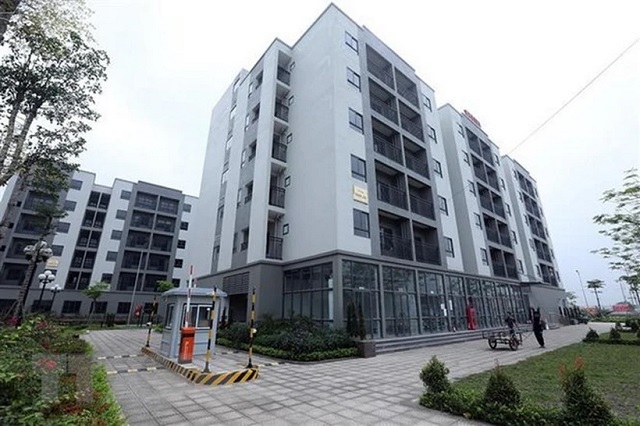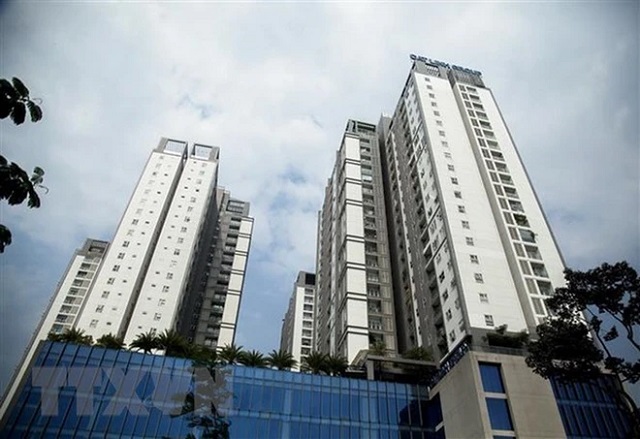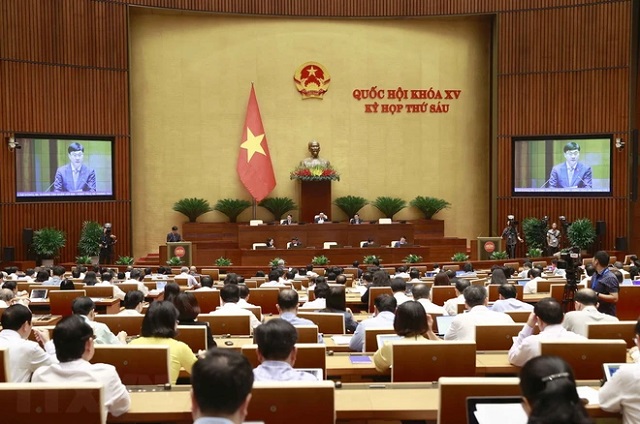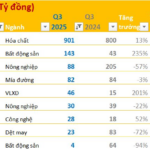
A residential project in Dai Lam-Dai Thinh New Urban Area, Hanoi. (Photo: Phan Tuan Anh/TTXVN)
|
A pilot project to implement commercial housing projects through agreements on land use rights or existing land use rights for other land is being solicited for opinions from ministries, sectors, localities, associations and collectives before March 10, according to Document No. 73/TB-VPCP of the Government Office announcing the conclusion of Deputy Prime Minister Tran Hong Ha.
At the same time, the Ministry of Natural Resources and Environment sent the documents to the Ministry of Justice for appraisal, proposing the issuance of a resolution of the National Assembly on the pilot implementation of commercial housing projects through agreements on land use rights or existing land use rights for other land and the pilot separation of compensation, support, resettlement, and site clearance work into independent projects.
In particular, the pilot implementation of commercial housing projects with other land has attracted public attention with the hope that this will be an important solution to help overcome the difficulties that real estate projects are facing due to legal entanglements related to land. Thereby, it will increase the supply of the real estate market, as well as solve difficulties for businesses.
According to reports from localities and associations, there are currently hundreds of commercial housing investment projects nationwide that are being stuck and unable to be implemented due to regulations that require the project to have residential land or some part of the land in order to proceed with the commercial housing project. In Hanoi alone, there are about 82 projects, while Ho Chi Minh City has about 126 projects…
This has caused damage to businesses, reduced the supply of projects, and pushed up housing prices. Therefore, experts believe that if the supply of housing is not expanded to meet the fast pace of urbanization and population concentration in major cities, the demand for housing will continue to outstrip supply, resulting in higher housing prices. Currently, Vietnam’s housing prices are considered to be too high compared to the average income of society. Therefore, it is necessary to implement commercial housing projects through agreements on land use rights or existing land use rights (without residential land).

A condominium in the center of Ho Chi Minh City. (Photo: Hong Dat/TTXVN)
|
According to the Ho Chi Minh City Real Estate Association (HoREA), the use of land for economic and social development projects through agreements on land use rights has been established in the land law system since the 1993 Land Law and has been maintained until now. This mechanism coexists with the state’s land recovery mechanism.
However, the newly adopted Land Law (amended) does not allow investors to agree on the transfer of land use rights for two cases: “residential land and other land” or “other non-residential land” to implement commercial housing projects, which is a limitation.
Therefore, the construction of a pilot project to implement commercial housing projects through agreements on land use rights or existing land use rights for other land will create a special mechanism. This mechanism has the advantage of shortening the land transfer time from land users to investors if there is agreement. At the same time, it still ensures the appropriate sharing of interests between investors and land users, as well as the public interests of the state.
This means continuing to implement the negotiation mechanism between citizens and businesses in land use rights transfer to implement urban projects and commercial housing. This will significantly reduce the number of lawsuits of affected people, reduce the costs and manpower of the administrative system, and limit the negative effects and disruptions when the state recovers land.
Le Hoang Chau, Chairman of HoREA, analyzed that if only investors are allowed to agree on land use rights for residential land, there will not be enough residential land for investment in large-scale commercial housing projects or urban areas. Meanwhile, there are already many investors who have invested a large amount of capital to acquire “agricultural land” or “non-agricultural land that is not residential land” in the planned urban development areas and residential areas in accordance with the previous Land Law. If they are subjected to the new regulations, all of these investors will no longer be recognized as commercial housing project investors. That will be unfair.
Lawyer Nguyen Thanh Ha, Chairman of SBLaw Law Firm, said in 2022, the National Assembly enacted Law No. 03/2022 amending 9 laws allowing businesses to accept the transfer of residential land or residential land and other non-residential land suitable for planning to implement investment projects, and before that, the Investment Law in 2020. This legal corridor is considered a major step forward in removing obstacles for commercial housing investment projects.
Accordingly, these regulations allow investors to use a part of residential land and a part of other land (such as agricultural land, non-agricultural land leased for one-time payment or annual payment) for the implementation of commercial housing projects if they meet the conditions for changing the land use purpose (consistent with planning types).
However, the Land Law 2024 (Article 122, 127), which was recently passed and will take effect on January 1, 2025, stipulates that investors are only allowed to implement commercial housing projects through agreements on land use rights for residential land; use existing land use rights to implement commercial housing projects for 100% residential land or a part of residential land and a part of other land.

The National Assembly discussed some remaining different opinions on the draft Land Law-amended on November 3, 2023. (Photo: Doan Tan/TTXVN)
|
Therefore, the current laws as well as future laws do not allow investors to use other types of land (without residential land) to change the land use purpose for commercial housing (in this case, it must be done through the mechanism of auctioning land use rights, bidding for projects that use land).
“This is a major obstacle because there are hundreds of projects being stuck because investors have ‘accumulated’ land but do not have any residential land, so they cannot implement the project,” said lawyer Ha.
Echoing this view, Nguyen Van Dinh, Master of Real Estate Law, emphasized that the Land Law 2013 (Article 57) and the Land Law 2024 (Articles 121, 122) both have provisions on changing the land use purpose and also closely regulate the conditions, procedures, and roles of state authorities in assessing and approving, as well as the financial obligations arising… in order to limit the risks when allowing changes in purpose.
Among the cases where changing the land use purpose must be permitted by competent state authorities, there are cases such as changing agricultural land to non-agricultural land or changing non-agricultural land that is not residential land to residential land. These are cases that can be applied to change the land use purpose to implement commercial housing projects. Therefore, maintaining separate conditions for different types of land to be converted into commercial housing is unnecessary and can cause many consequences.
Thus, the construction of a resolution of the National Assembly allowing the pilot implementation of commercial housing projects through agreements on land use rights or existing land use rights for other land (without residential land) is necessary to eliminate legal barriers, diversify the supply of housing, meet the needs of the people, and reduce housing prices.
Thu Hang




































